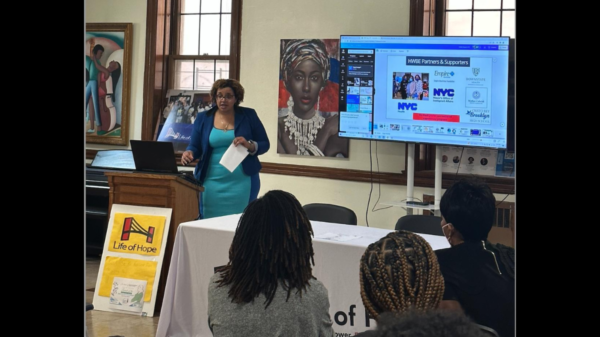
When V.T. came to the United States in 2019 on one of many trips to visit friends and family, he genuinely planned to go back to Port-au-Prince. But with few employment options in Haiti’s capital, a daughter to feed and send to school, and extended family members in need of some financial support, V.T. decided to overstay his tourist visa.
For years, V.T., who asked that his full name not be disclosed to minimize backlash, used the documents of friends to earn a living. With them, he was able to work in manufacturing for $12, then $14 per hour. His employers knew his situation, but chose to hire him anyway.
“When you work under a false name, you are a little bit afraid,” he said. “Some people in the agency or in the company where you’re working consider you a little bit differently.”
In March 2021, V.T., then 40, received Temporary Protected Status (TPS). The immigration program allows people from certain countries, including Haiti, to live and work legally in the U.S. and obtain travel authorization as the designation period is active. With it, V.T. successfully applied for an Employment Authorization Document (EAD), which allowed him to work for a specified period.
“I felt happy,” said V.T. about receiving TPS. “And then I thought, ‘it’s temporary, but it’s better than working without it.’”
He immediately took his new social security number and work permit to his employer, the first time V.T. had worked in the U.S. under his real name. He was also thrilled to open a bank account into which his employer would make a direct deposit. V.T. said he could send a larger remittance to his family, as he had the proper ID that money transfer companies insisted on checking. Without it, he said, the money transfer amounts he could send were limited.
On Dec. 5, the U.S. Department of Homeland Security (DHS) extended the TPS designation for Haitians living in the U.S. through Nov. 6. An estimated 100,000 people who did not already have TPS, a Green Card, citizenship or other legal status are eligible to apply for this new designation, which is set to expire August 3, 2024.
V.T. is among that group. Now, he plans to apply for Advance Parole – which allows people with TPS to travel from the U.S. – so he can see his family in Haiti.
Life in the shadows unavoidable for some
TPS is welcome news, indeed. And yet, the “shadows” — the space into which immigrants must go because they don’t have the right paperwork — beckon. Despite the temporary protections the U.S. government provides to some, the complexity of the system, an immigrant’s lack of money and fear of drawing attention often make it safer for some people to stay in the shadows.
“Being undocumented in this country is hard,” said Aaron Reichlin-Melnick, Policy Director at the American Immigration Council, a nonprofit advocacy group. “You have so many things you have to think through and navigate and live.”
Immigrants, even those who enter the U.S. with their documents in order, often have trouble navigating the maze of immigration policies and procedures advocates and legal experts say. Immigrants often must teach themselves about the process or find others to advocate for them.
For some, the alternative of living without the paperwork is a smaller investment of resources, time and emotional energy, Reichlin-Melnick said.
“In some ways, it might be easier to simply disconnect and disengage because [immigration] is so overwhelming,” Reichlin-Melnick said. “[The system is] especially not easy for people who have just arrived here, for people who don’t speak English, for people who may not have significant formal education. And for people who are literally working to the bone to make sure they have food.”
Meanwhile, scammers are always ready to take advantage of immigrants and their situation, with some offering to help with immigration processes, including TPS, for a fee. As of this writing, it’s not possible to apply for the TPS designation announced in December.
“Be careful who you go to and where you seek help,” said Marleine Bastien, a longtime Haitian American immigration advocate and newly-elected Miami Dade Commissioner. “Sometimes you think that you’re doing the right thing, when in fact, you are worsening your condition.”
Immigration policies difficult for the uninitiated
Take for example, S.F., a client of New York immigration attorney Emanuel Depas. S.F. was one of the 12,000 estimated Haitian migrants allowed into the U.S. from the Del Rio encampment last fall.
S.F., whose real name is not divulged to protect his livelihood, went through processing at the Texas border, talked to staff at a nonprofit organization and was admitted to the U.S., Depas said. Another nonprofit referred to S.F. was supposed to help him through the next part of the immigration process.
“He never got a call — nothing,” Depas said. “He decided to see me, and that’s what I realized — he’d lost five months.”
The loss of time, Depas explained, is because S.F. had the status of an ‘arriving alien.’ That designation allows immigrants who have to apply for a work authorization card right away.
Such cases aren’t unique, Depas said.
Many immigrants miss legal deadlines, often failing to file the right paperwork because they don’t understand the steps necessary for employment or asylum. And like some Haitian migrants, S.F. sought help from an attorney, whose fees can be steep for people with little to no money.
To help one couple who missed a court date and were ordered deported, Depas prepared a motion to reopen the case, which was granted, at a cost of $2,000. Unable to pay for the next step, the asylum hearing, the couple disappeared.
Advocates have pushed the federal government to better educate immigrants. The reason many fail is they miss a court date — not because they lose their case, Reichlin-Melnick said.
“Some people say, ‘Well, I’ll just take my chances.’ Sure. They might — even if they have a winnable [asylum] case — but they wouldn’t know that because it’s so tricky to navigate the system.”
Finding employment remains top priority
Since the 2010 earthquake, Haitians migrating to other countries looking for employment has climbed. A mixture of political upheaval and lack of jobs forced Haitians northward looking for a new life. Between 15,000 and 30,000 migrants, according to the Center for Immigration Studies, arrived at the U.S. southern border after journeying from South and Central America in September 2021.
That year through February 2022, more than 25,000 others were deported, according to the International Organization for Migration, part of the United Nations System. More continue to be deported through this month.
For those allowed in, finding a place to live and work are the priorities, especially jobs. Many head to Florida, New York, Massachusetts or anywhere they have relatives and friends already living as permanent residents or citizens. Often, these connections provide transportation from the southern border to their homes and a place to live.
Earlier this year, states like Texas and Arizona began bussing migrants from border cities to sanctuary cities after those immigrants were processed by immigration officials. In New York City, 21,700 immigrants had arrived from Spring to the end of October, according to officials. The city has built shelters to house them, including Haitians, until they could find permanent places to live or work.
While finding housing may be doable, the immigration process doesn’t automatically provide employment and other documents required, such as a temporary work authorization for a parolee. This leaves room for some employers to hire immigrants without proper papers, which often leads to exploiting immigrants and putting them at risk.
When V.T. first arrived in 2019, for example, his Haitian friends helped him find a job without papers, he explained. They introduced him to a taxi driver who let V.T. use his social security number. Later, they introduced him to someone at an employment agency who connected him to an employer.
“He paid me $12 an hour,” V.T. said. “But then, because of my experience and some of the new things I learned to do, he said, ‘I know you’re here for a long time. You know I know your status. But I’ll pay you $2 more an hour.’”
For most immigrants, this mindset works while waiting for more permanent solutions.
Likewise, with regard to TPS, the sense is that it’s a good step, but it shouldn’t replace permanent, comprehensive immigration policies.
Upon receipt of TPS, V.T. picked up a part-time job at FedEx to meet his financial needs as his full-time job wasn’t offering overtime. With TPS in place, he is planning to visit Port-au-Prince to see his family, which he hasn’t seen in five years.
Migrants, immigration attorneys and advocates say putting people in line to start the process for permanent residency is ultimately what the U.S. government must prioritize.
“Very few people arrive and think, ‘Well, I’m just going to disappear,’ because most people think there is a process and they want to go through it,” Reichlin-Melnick said.
“They believe the government is rational, and we’ll let them have a chance to present their case for why they should be allowed to stay,” he said. “But the system doesn’t really work that way.”
Ashley Miznazi contributed to this report from Florida









You must be logged in to post a comment Login